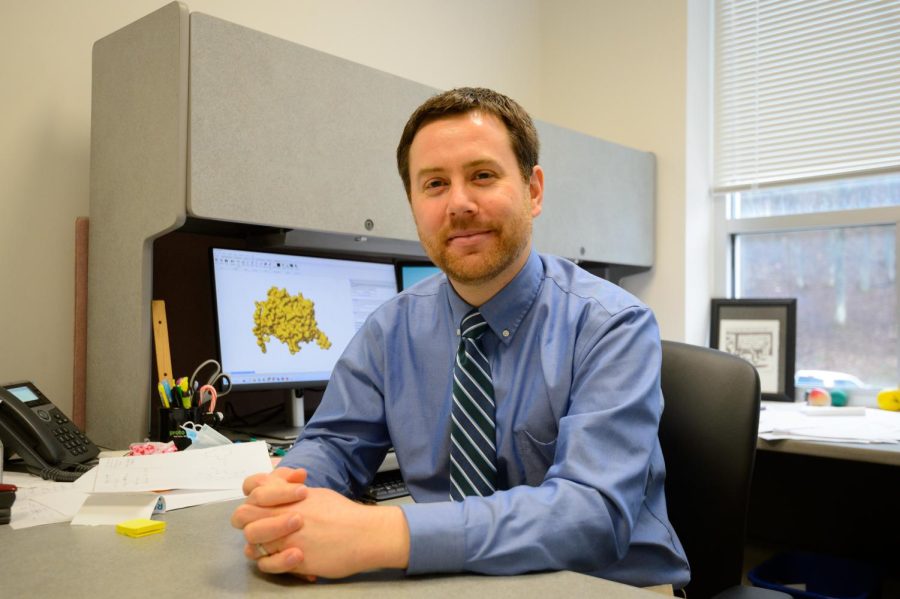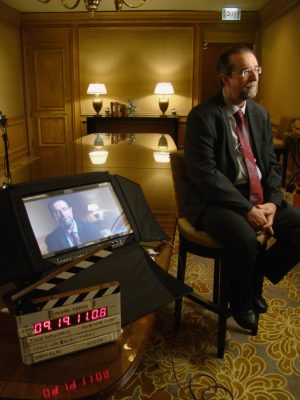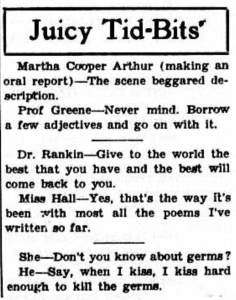App State professor receives record-breaking grant
Michael Reddish poses for a portrait in his office at Appalachian State University.
March 20, 2023
After finishing up one of his lab classes, Michael Reddish looked at his phone and saw the best news he could have ever hoped for. He rushed back to his office to immediately email his wife the good news: he had been awarded the single largest grant for a single primary investigator in App State history.
Reddish, assistant professor and research mentor for the Department of Chemistry and Fermentation Sciences, has taught at the university since 2019, yet the National Institute of Health approved his research and subsequently awarded him $1.6 million over the course of the next five years.
“My lab studies a family of enzymes called the Cytochrome P-450 enzymes,” Reddish said. “They have a lot of roles in drug metabolism, but the ones we focus on play roles in how our bodies make and break down steroids.”
Reddish had many things to say about the Department of Chemistry and Fermentation Sciences in regard to how they contributed to his research, and those feelings were mutual from the department as well.
“We have more faculty thinking of applying for grants of similar or even greater size than his now,” said Petia Bobadova. “So for us he’s a perfect example and inspiration to everyone here in the department.”
Bobadova and others in the department are hopeful that the exposure of Reddish’s record breaking grant could bring more students into the department and bring more notoriety to the university.
Reddish’s grant was specifically designed by the National Institute of Health to provide funds for researchers that were in the early stages of their careers. He earned his doctorate in 2015, and in seven years he achieved this milestone in his career.
Reddish said he has been looking to turn this dream into a reality for several years now, first submitting the request for the grant back in fall of 2020. While that proposal ended up being rejected, Reddish described that setback as “an important learning experience.” A year later during the summer of 2022, Reddish was officially awarded the funds by the National Institute of Health.
While Reddish described several ways in which his research could be applied in the scientific field, one of the more prominent uses had to do with the enzyme’s application to breast cancer research. Reddish said that cells in the body tend to misinterpret certain signals, leading to the development of cancer.
“If you could decrease the production of that signal, then you might have a new way to treat some forms of cancer,” Reddish said. “It’s like the people who design drugs are planning a bank heist. If they don’t have the blueprints for what they are trying to do they can’t make a logical plan.”
Having obtained such a large amount of money to put toward this research, Reddish immediately began putting that money toward expanding opportunities for his students once he received access to it back in September.
“My students do most of the work in the lab, if not all the work in the lab. Their work was critical in getting that preliminary data to show that we could do that work,” Reddish said.
One way that Reddish has used the grant funds to give back to his students has been to expand the lab, including hiring former students as lab technicians. One of those students-turned-employees, Zach Davis, was excited and proud of the work Reddish had done to receive this grant.
“I know this grant will do some pretty good things for the university, bring some more attention to the university,” Davis said. “I think it will help other professors achieve some other high level grants as well, especially if we can produce above and beyond what we’re expecting to.”
While Reddish was confident in his grant proposal – which he formed with the guidance of others in his department – he was still positively surprised about receiving the grant, and even more surprised by its record breaking status.
“For me it confirms that Appalachian is a place where people can do some really big and powerful work, and that our students are capable of contributing — and do contribute — to high level research,” Reddish said. “It’s nice to see that recognized by the community at large, that people outside of our locale might know more about the work and the capabilities of the students here.”
CORRECTION: A previous version of this article misstated a source’s title. This error has been corrected.
















Julie Hasson • Mar 28, 2023 at 10:31 am
This is awesome! There are currently two grants being directed by faculty members in School Administration, each over two million dollars for a five year period.